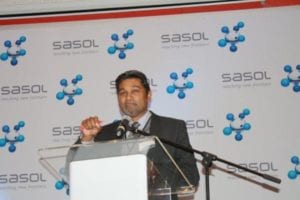Pictured: Water Research Commission CEO, Dhesigen Naidoo
As a large industrial user of water, Sasol has formed strategic partnerships with the Department of Basic Education in the Free State, the Department of Water Affairs (DWA) and the Water Research Commission (WRC). In two separate collaboration agreements, Sasol has undertaken to promote water conservation and improve treatment technologies and the re-use of waste water in South Africa. Typical water losses in municipalities vary between 30 and 45%, mostly from ageing distribution systems and broken or leaking plumbing fixtures, such as taps and toilets. To reduce these losses, DWA has set a target of a 15% reduction of municipal water use by 2015. “Sasol’s partnership with the Department of Basic Education in the Free State and the DWA, known as Project Busa Metsi, seeks to minimise water losses at schools and educate learners on the importance of water conservation; especially in the Metsimaholo Municipality. This municipality receives its water from the Vaal River system, together with approximately 40% of South Africans,” said Sasol’s executive director, Nolitha Fakude. More than sixteen schools will benefit from this project. A partnership between Sasol Technology and the Water Research Commission (WRC) will see both parties collaborate on finding new technologies and opportunities to conserve water in South Africa.Sasol Technology will offer the use of some of their Research and Development (R&D) Piloting facilities in Sasolburg and Secunda to researchers and academics from the WRC for research in conjunction with Sasol Technology teams.
Dhesigen Naidoo, WRC CEO said, “Through this partnership, we want to fortify our science, technology and innovation partnership to ensure a higher input of knowledge and workable technologies to empower responsible water citizenship at all levels to ensure a water successful future for our beautiful country. We are also confident that with the huge support of national and provincial governments, we have the right partnership formula to ensure its sustainability.” This partnership will also see the creation of a joint research commission (JRC) which will oversee and monitor the partnership and seek out new opportunities for collaboration on other water conservation matters. The Sasol-WRC agreement will include amongst others, collaboration in the following key research areas;- Climate change;
- Water resource availability and accessibility;
- Catchment management and water quality improvement;
- Water foot printing and best practices for the private and public sectors;
- Water conservation and water demand management;
- Technological development for the treatment and management of water, waste water and residual by-products;
- Residual by-product treatment and management (ash, brine and sludge management);
- Ecosystems remediation and rehabilitation;
- Groundwater impact, vulnerability and remediation.








